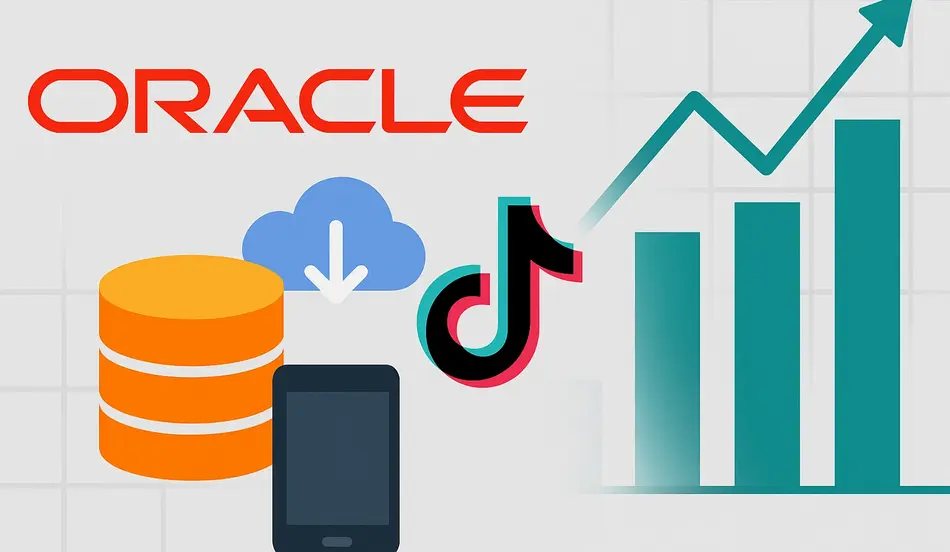Oracle, TikTok and That $455 Billion Surprise – this is the story of how an old-school enterprise tech firm that had been written off as “IBM-like” staged one of the most incredible comebacks in Silicon Valley history. True to its name, only Oracle seemed to see this coming, delivering its biggest stock jump since 1992 and stunning Wall Street with a $455 billion forecast that blew away analyst expectations by nearly fourfold.
For job seekers and tech professionals, this isn’t just a financial story—it’s a masterclass in career strategy, market timing, and understanding how to position yourself in an industry that’s constantly evolving. Oracle’s transformation from a traditional database company to a cloud infrastructure powerhouse offers valuable lessons about identifying emerging opportunities and building skills that will remain relevant as technology shifts.
The Shocking Numbers That Changed Everything
Oracle’s September 9th earnings call delivered numbers that nobody saw coming:
• $455 billion in forecasted contracts over the next few years
• 77% growth in infrastructure revenue to $18 billion this fiscal year
• $89 billion increase in Larry Ellison’s net worth in a single day
• Fourfold increase over the same period a year earlier
These weren’t just impressive numbers—they represented a fundamental shift in how investors viewed Oracle. The company had been written off as a legacy enterprise software provider, but suddenly it was competing with the flashiest startups and winning. CEO Safra Catz, considered one of Wall Street’s sharpest financial minds, had delivered the kind of growth that typically comes from Silicon Valley’s hottest new companies.
The Perfect Storm: What Made Oracle’s Comeback Possible
Several factors converged to give Oracle the opportunity of a lifetime. The traditional cloud computing leaders—Amazon, Microsoft, and Google—were strained for capacity, creating a massive opportunity for a well-funded competitor to enter the market. Oracle had the cash flow from its database business to underwrite massive growth into cloud infrastructure, and they used it strategically.
The AI boom created unprecedented demand for computing power, with Nvidia CEO Jensen Huang predicting $4 trillion would be spent on AI infrastructure by the end of the decade. Oracle positioned itself perfectly to capture this demand, securing deals with companies like OpenAI that committed to almost $300 billion in compute over multiple years.
Project Stargate: The Most Ambitious Infrastructure Project in History
Oracle’s transformation became visible to the world when they appeared at the White House alongside Sam Altman and the president to announce Project Stargate. This multi-year partnership between Oracle, OpenAI, and SoftBank aims to build data centers for AI across the US, representing the single largest contract in history.
The scale is almost incomprehensible:
• 4.5 gigawatts of computing power—equivalent to two Hoover Dams or four nuclear reactors
• Hundreds of billions in investment across multiple years
• Ground already broken in Abilene, Texas, with capacity “off the scale”
This isn’t just about building data centers—it’s about creating the infrastructure that will power the next generation of AI applications, making Oracle a critical player in the future of technology.
Oracle’s $455 Billion Comeback
Oracle’s resurgence, fueled by bold partnerships like TikTok, shows how innovation and strategy can spark massive growth. Employers can capture the same momentum by hiring forward-thinking talent ready to drive transformation. Post your job on WhatJobs today and connect with professionals prepared to deliver big results.
Post a Job Free for 30 Days →The TikTok Connection: A Strategic Masterstroke
Oracle’s relationship with TikTok represents one of the most strategic moves in recent tech history. When President Trump tried to ban TikTok in 2020 over national security concerns, TikTok turned to Oracle for help expanding their infrastructure. Oracle now runs the entire TikTok US operation, giving them intimate knowledge of one of the world’s hottest social media platforms.
This relationship led to Oracle being named as part of the consortium that will acquire TikTok’s US operations, alongside Silver Lake. The deal gives Oracle not just a major social media platform, but also the data and user engagement that comes with it—valuable assets for a company building AI infrastructure.
The Career Lessons for Tech Professionals
Oracle’s transformation offers several key lessons for job seekers and tech professionals:
• Legacy companies can reinvent themselves – Don’t write off established companies as “too old” to innovate
• Infrastructure is the foundation – As AI and cloud computing grow, infrastructure providers become increasingly valuable
• Government relationships matter – Oracle’s White House connections opened doors that pure technical excellence couldn’t
• Strategic partnerships are crucial – Oracle’s relationships with OpenAI, TikTok, and SoftBank created opportunities that wouldn’t exist alone
The Risks and Challenges Ahead
Despite the excitement, Oracle faces significant challenges. The company is now the most leveraged among hyperscaler providers and is bleeding cash as it builds out infrastructure. CEO Safra Catz announced that CapEx would be $9 billion higher than expected, and Oracle has gone from being a cash cow business to having negative free cash flow.
The $300 billion contract with OpenAI raises two critical questions: Does Oracle have the money to build the infrastructure, and does OpenAI have the $300 billion to pay for it? OpenAI has committed to giving Oracle more money than it currently has in revenue, assuming current growth rates continue—a serious risk if anything goes wrong.
The Broader Implications for the Tech Industry
Oracle’s success signals a broader shift in the tech industry. Traditional enterprise companies are no longer content to be “legacy” players—they’re aggressively competing with startups and winning. This creates new opportunities for professionals who understand both traditional enterprise needs and modern cloud technologies.
The AI infrastructure boom is creating demand for skills that didn’t exist a few years ago, from data center design to AI model deployment. Professionals who can bridge the gap between traditional enterprise systems and modern cloud infrastructure will be in high demand.
The Future of Tech Careers
Oracle’s transformation suggests that the future belongs to companies and professionals who can:
• Scale infrastructure to meet unprecedented demand
• Build strategic partnerships across industries and government
• Adapt legacy systems to modern cloud architectures
• Navigate regulatory environments while maintaining innovation
For job seekers, this means focusing on skills that enable infrastructure scaling, understanding both traditional and modern technologies, and building relationships across different sectors of the economy.
Frequently Asked Questions
What is Oracle, TikTok and that $455 billion surprise?
Oracle, TikTok and that $455 billion surprise refers to Oracle’s stunning comeback, where the company announced $455 billion in forecasted contracts, partnered with TikTok, and became a major player in AI infrastructure through Project Stargate.
How did Oracle achieve such massive growth?
Oracle achieved massive growth by pivoting from traditional database services to cloud infrastructure, capitalizing on the AI boom, securing partnerships with OpenAI and TikTok, and building strategic relationships with the government.
What is Project Stargate?
Project Stargate is a multi-year partnership between Oracle, OpenAI, and SoftBank to build data centers for AI across the US, representing the single largest contract in history with 4.5 gigawatts of computing power.
Why is Oracle’s TikTok partnership significant?
Oracle’s TikTok partnership is significant because it gives them control over one of the world’s hottest social media platforms, valuable user data, and positions them as part of the consortium acquiring TikTok’s US operations.
What are the risks for Oracle’s future growth?
The risks for Oracle’s future growth include being the most leveraged hyperscaler provider, negative free cash flow from infrastructure buildout, and the uncertainty of whether OpenAI can actually pay the $300 billion they’ve committed.
How does Oracle’s success affect tech careers?
Oracle’s success affects tech careers by showing that legacy companies can reinvent themselves, creating demand for infrastructure and AI skills, and demonstrating the value of strategic partnerships and government relationships.
A Real-World Example: David’s Career Transformation
David, a 35-year-old software engineer, had spent his career working with traditional enterprise databases but felt his skills were becoming outdated as the industry shifted toward cloud computing and AI. When he heard about Oracle’s transformation and their massive investment in AI infrastructure, he saw an opportunity to pivot his career.
“I had been working with Oracle databases for years, but I felt like I was being left behind as everyone moved to the cloud,” David explains. “When I saw Oracle’s comeback and their focus on AI infrastructure, I realized my traditional database skills could actually be valuable in this new landscape.”
David began learning about cloud architecture and AI model deployment while leveraging his existing knowledge of enterprise systems. He applied for positions at Oracle and other companies building AI infrastructure, emphasizing his ability to bridge traditional and modern technologies.
“Within six months, I had three job offers,” David says. “Companies were specifically looking for people who understood both the legacy systems and the new cloud infrastructure. My traditional database experience, combined with new cloud skills, made me incredibly valuable.”
David’s story illustrates how Oracle’s transformation created new opportunities for professionals who could adapt their existing skills to emerging technologies, rather than starting completely from scratch.
Position Yourself for the Infrastructure Revolution
Oracle’s incredible comeback story proves that the tech industry is full of surprises and opportunities for those who are prepared. The AI infrastructure boom is creating unprecedented demand for skilled professionals who can build, scale, and manage the systems that will power the future.
Don’t let traditional thinking limit your career potential. The companies and professionals who succeed will be those who can adapt, innovate, and build the infrastructure that the world needs.




